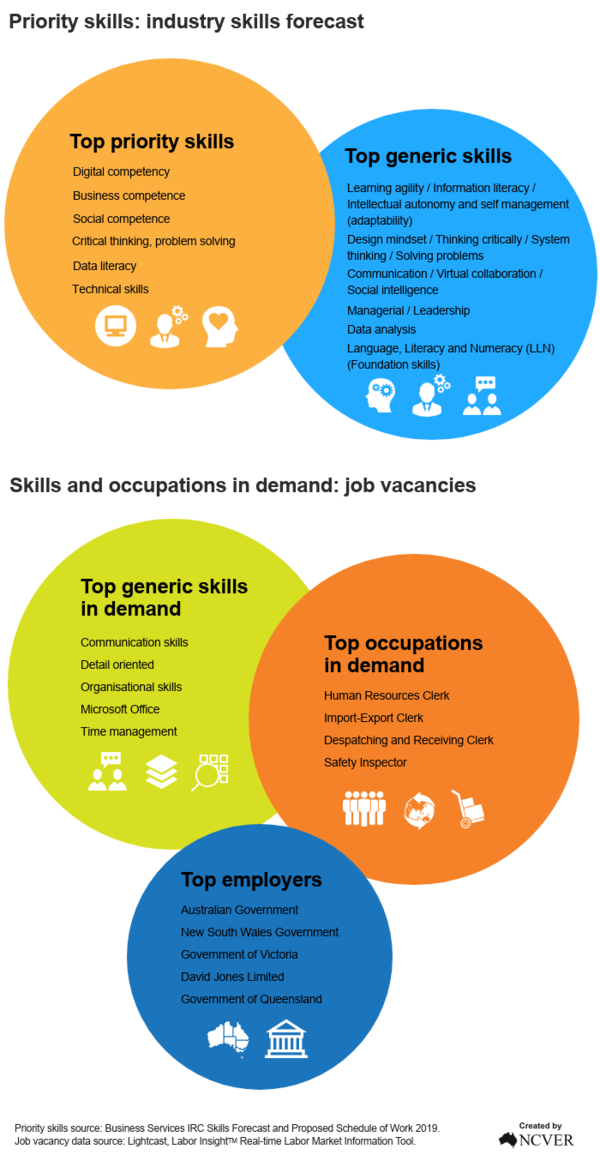
Industry insights on skills needs
Job vacancy data indicates that the most in demand occupations for the Specialised Business Services sector are Human Resources Clerk, Import-Export Clerk, Despatching and Receiving Clerk, and Safety Inspector. The largest employers for this sector are mainly governments as well as David Jones Limited, with the Australian Government at the top of the list. These data also show the key skills in demand from employers in the Specialised Business Services sector are:
- Communication skills
- Detail-orientated
- Organisational skills
- Microsoft Office
- Time management.
The Business Services IRC’s 2019 Skills Forecast identifies work health and safety as one of the Business Services areas employment is shifting to as a result of de-industrialisation. Other job roles in this sector, particularly those of a clerical nature, are predicted to be impacted by automation in the future. Workers with specialised skills which automation cannot readily replace are expected to become more productive as automation tools increase the efficiency of their other job tasks.
The TAFE Enterprise white paper Soft Skills vs Hard Skills identifies the development of soft skills as being a contributor in helping workers adjust and retrain as the nature of jobs transforms. Soft skills such as creativity, adaptability, time management and collaboration in particular are identified in helping workers process new information.
The Business Services IRC’s 2018 Skills Forecast identifies a range of trends relevant to workers in this sector. For those working in compliance and risk management, such as Quality Auditors, changes brought about by automations and digital disruption will change the nature of their jobs. There are many opportunities for streamlining in compliance because of this, but it requires businesses to be prepared to embrace new and innovative ways of approaching risk and compliance.
Legal occupations and conveyancing are also being affected by automation, the Business Services IRC’s 2018 Skills Forecast relates, with many paralegal VET-related occupations at risk for disruption. The transition to e-conveyancing represents a significant shift for those working in the area and the use of these digital platforms is critical for these businesses.
In the area of human resources, the Business Services IRC’s 2018 Skills Forecast details changes including workers expanding their focus to manage staff learning, internal change and the workplace culture. Those in this area are also required to be responsive to economy-wide shifts towards new skills, including the importance of soft skills.
The Business Services IRC’s 2018 Skills Forecast discusses convergence in skills required for those working in information management, often in library or information services roles. Previously manual tasks now require the use of digital technologies, which in turn enables the streamlining and expansion of many existing collections. It is particularly important for workers in this area to be able to distinguish between reputable and non-reputable data sources due to the large volumes of data available.
One area predicated to grow by the Business Services IRC’s 2018 Skills Forecast is work health and safety, with these workers being required across a range of industries. Skills in conducting safety audits and working with businesses to reduce health problems and injuries in the workplace are central to this field. Trained workers in this area are particularly needed in higher risk industries such as mining, manufacturing and construction.
The VET Era: Equipping Australia’s Workforce for the Future Digital Economy, a report from the CSIRO and TAFE Queensland, found that one technical skill that occupations with higher than average employment growth required was management of personnel resources. This suggests that both human resources-specific occupations and those with a human resources component are experiencing continuing growth and will need appropriate training of new entrants into these occupations to meet demand.
An analysis of priority qualifications by the South Australian Training and Skills Commission in their Report on South Australia’s Industry Priority Qualifications included a number of qualifications in this sector as ‘highest priority’ qualifications. This included those related to work health and safety, as well as library and information services. Though qualifications in this sector may see a relatively small number of yearly enrolments as compared to other Business Services sectors, there is a demand for skilled workers with Specialised Business Services-related qualifications.

